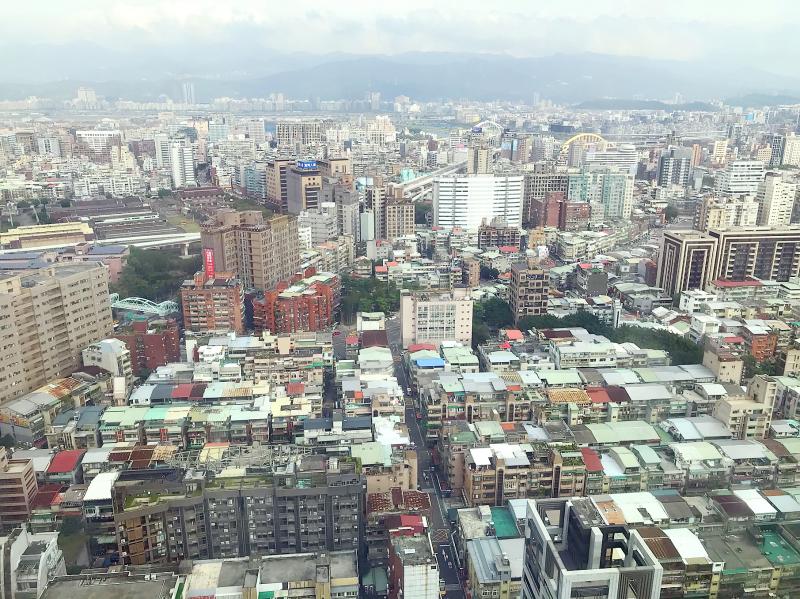Presale and new housing projects last quarter surged 38.1 percent from three months earlier nationwide, as the market emerged from a local COVID-19 outbreak, aided by excess liquidity and low interest rates, a survey by Cathay Real Estate Development Co (國泰建設) showed on Wednesday.
Developers and builders launched NT$339.2 billion (US$12.19 billion) of presale and newly completed houses on the market in the July-to-September quarter, the survey found.
The recovery in confidence was particularly evident in Kaohsiung, where presale projects and new houses grew 90.6 percent, followed by 83.5 percent in Taichung, 69.5 percent in New Taipei City and 57.2 percent in Taipei, it said.

Photo: Hsu Yi-ping, Taipei Times
However, presale and new housing projects declined 18.8 percent in Taoyuan, fell 46.4 percent in Hsinchu and plunged 37.6 percent in Tainan mainly due to high comparison bases, it said.
The sustained uptrend in house and land loans prompted the central bank last month to ban grace periods for second-home mortgages in the six special municipalities, as well as Hsinchu city and county, but unfavorable lending terms have failed to rein in real-estate lending so far, government data showed.
Potential closing home prices averaged NT$319,600 per ping (3.3m2) across the nation, climbing 4.05 percent from three months earlier, the survey showed.
The figures in Taipei rose 3.16 percent to NT$938,000 per ping, and edged up 1.1 percent in New Taipei City to NT$409,400 per ping.
Kaohsiung posted the biggest advance of 6.97 percent to NT$260,000 per ping, followed by Taichung with a 5.87 percent increase, but Taoyuan bucked the trend, declining 0.72 percent to NT$270,200 per ping, the survey showed.
Price concession rates shrank 3.28 percentage points to 10.17 percent in the third quarter, while the 30-day sales rate gained 5.05 percentage points to 16.5 percent, it said.
The market could receive continued support from ample liquidity and low borrowing costs, but the central bank could weigh in to prevent overheating, it said.

In Italy’s storied gold-making hubs, jewelers are reworking their designs to trim gold content as they race to blunt the effect of record prices and appeal to shoppers watching their budgets. Gold prices hit a record high on Thursday, surging near US$5,600 an ounce, more than double a year ago as geopolitical concerns and jitters over trade pushed investors toward the safe-haven asset. The rally is putting undue pressure on small artisans as they face mounting demands from customers, including international brands, to produce cheaper items, from signature pieces to wedding rings, according to interviews with four independent jewelers in Italy’s main

Macronix International Co (旺宏), the world’s biggest NOR flash memory supplier, yesterday said it would spend NT$22 billion (US$699.1 million) on capacity expansion this year to increase its production of mid-to-low-density memory chips as the world’s major memorychip suppliers are phasing out the market. The company said its planned capital expenditures are about 11 times higher than the NT$1.8 billion it spent on new facilities and equipment last year. A majority of this year’s outlay would be allocated to step up capacity of multi-level cell (MLC) NAND flash memory chips, which are used in embedded multimedia cards (eMMC), a managed

Japanese Prime Minister Sanae Takaichi has talked up the benefits of a weaker yen in a campaign speech, adopting a tone at odds with her finance ministry, which has refused to rule out any options to counter excessive foreign exchange volatility. Takaichi later softened her stance, saying she did not have a preference for the yen’s direction. “People say the weak yen is bad right now, but for export industries, it’s a major opportunity,” Takaichi said on Saturday at a rally for Liberal Democratic Party candidate Daishiro Yamagiwa in Kanagawa Prefecture ahead of a snap election on Sunday. “Whether it’s selling food or

In the wake of strong global demand for AI applications, Taiwan’s export-oriented economy accelerated with the composite index of economic indicators flashing the first “red” light in December for one year, indicating the economy is in booming mode, the National Development Council (NDC) said yesterday. Moreover, the index of leading indicators, which gauges the potential state of the economy over the next six months, also moved higher in December amid growing optimism over the outlook, the NDC said. In December, the index of economic indicators rose one point from a month earlier to 38, at the lower end of the “red” light.